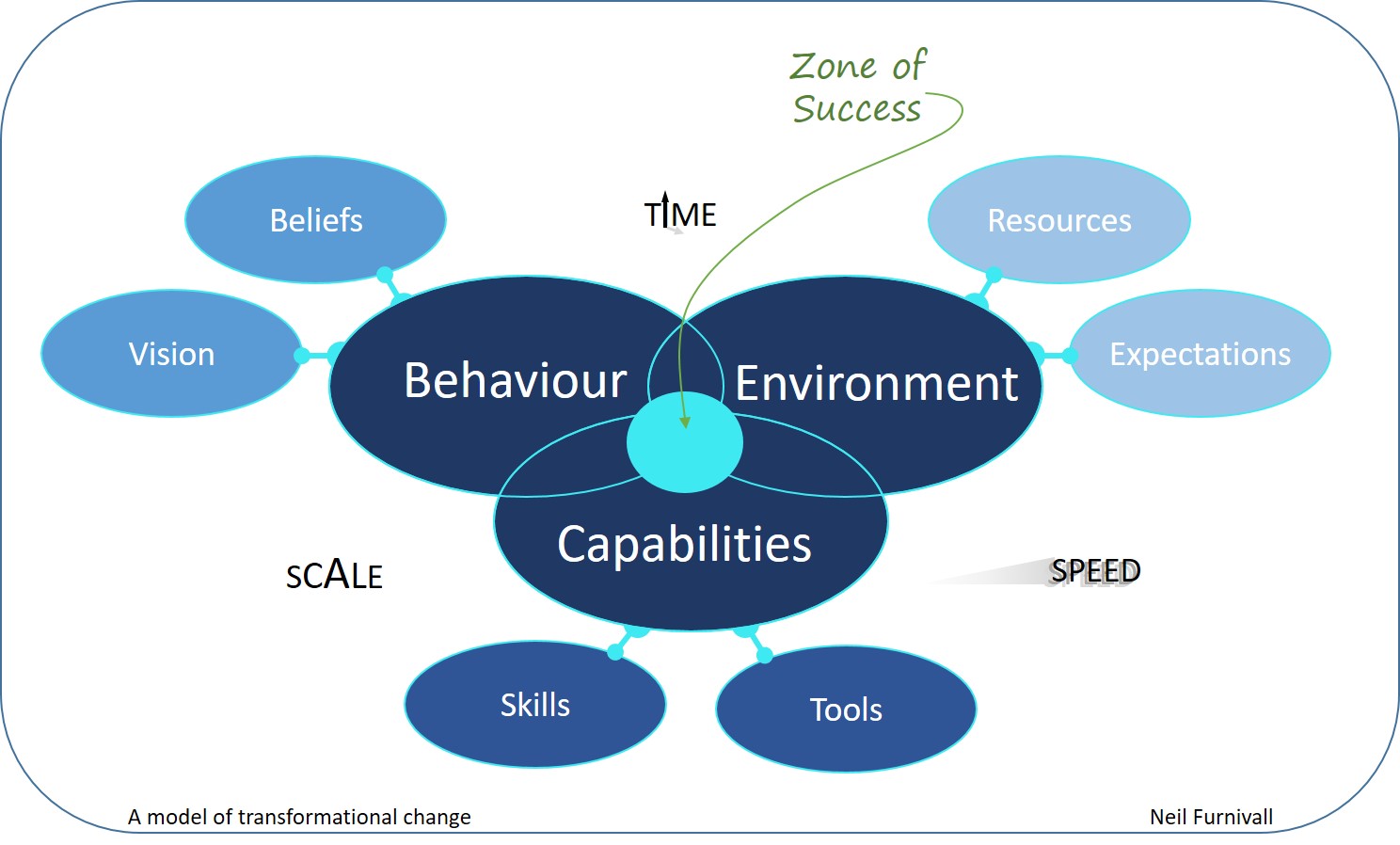Change: make or become different. Change is something we live with each day. The changing of the seasons, changing environment. Changing lives.
Transformation: a marked change in form, nature or appearance. We recognize a transformation when we see it, and in a changing business world, the ability to transform is fundamental to long term survival.
Recognising transformation is very different to delivering transformation. The purposeful act of transformational change is a complex endeavour, and, with anecdotal evidence suggesting that at least one in three change programmes fail, the potential for a transformation to fall short is exponentially greater.
With this likelihood of failure, why should transformation be so high on the current business agenda?
To understand that, as well as increase the chances of successfully transforming yourself or your organization; there are three fundamental factors to which you need to pay close attention: environment, behaviour, and capability.

The business environment, with escalating customer expectations and competition has evolved at a phenomenal rate, particularly over the last decade. The explosion of new technologies has enabled new capabilities and raised the bar on every imaginable measure. This has resulted in new opportunities, but also increasing complexity, uncertainty and risk. Organisations and the people within them, are finding themselves out of tune with customer needs; with processes, interactions and with behaviours unfit to deliver sustainable business value.
Change does not happen without a trigger. The motivation could be external (market pressures, declining financial performance, direct feedback) or internal (a visionary leader/team, strategic review, personal crisis). Either way the vision of the desired state and the belief that it can happen, need to be in place before new behaviours can emerge. It is very easy to focus on a new whizzy piece of technology, but if minds, thinking, and emotions are not equally supported, it will fail. Without a change in behaviour, you won’t transform.
A great vision and profound belief to maintain motivation is a start, but not enough. Skills and tools combining to form capabilities are needed to achieve that vision. This investment develops the foundations of what has the greatest effect on your situation. In the business context, market scanning and test and learns, quickly followed by scale ups are needed to relentlessly improve. It is often new, awkward and uncomfortable. Without new capabilities in support of your vision, you won’t transform.
To sustain the vision and keep your capabilities evolving requires a very strong interaction with, and awareness of, your environment. This is all about the feedback loop in order to meet the expectations of that environment, being flexible enough to adjust your approach and react to setbacks and opportunities when they emerge. It requires tapping into the many resources in your environment emphasizing interaction with your colleagues, customers, and creating close feedback mechanisms to understand what works and why. It often includes hiring in new capabilities, or leapfrogging development by acquisition or outsource. Without an environment that provides feedback on your vision and capabilities, transformational change will not be achieved.
Behaviours, environment and capabilities are necessary in any change programme. What makes transformation a necessity is due to the time in which change needs to be implemented; the speed of new developments; and the scale of items needing attention. The environment has moved so much that traditional behaviours are inappropriate for necessary outcomes; the scale of technological change, and the potential for excellence means a great shift in capabilities is necessary to remain relevant. If the an organization is not agile enough to react at speed, the behaviours and capabilities developed will not be appropriate to the environment, requiring constant catch up and diminishing returns.
The skill of carefully orchestrating behaviours, capabilities and environment align, means the zone of success becomes larger. If the ambition has been great enough, transformation will have taken place. The personal and organizational habits developed during the transformation become the groundwork for ongoing business success… and the achievement of transformational change becomes just the norm of doing business!
Article by channel:
Everything you need to know about Digital Transformation
The best articles, news and events direct to your inbox
Read more articles tagged: Definition, Digital Disruption, Featured







